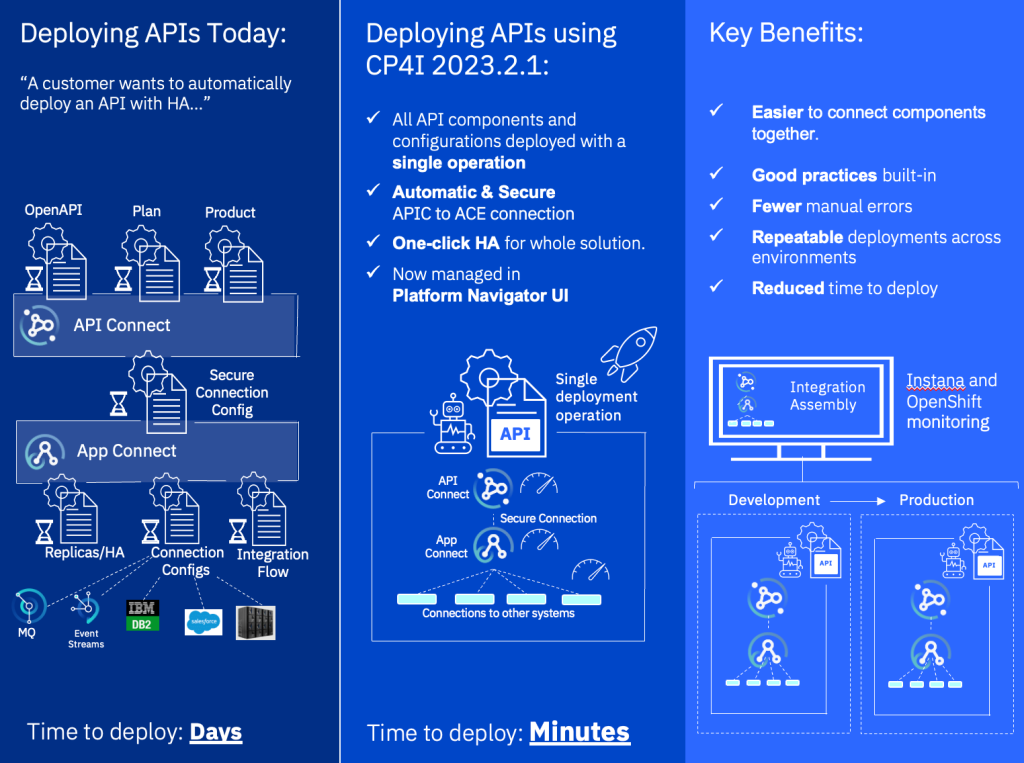Some good news that Cloud Pak for Integration 2023.4.1 announced today. And there are many different enhancements and new features. Let’s start by looking at the benefits of being small.

Many businesses are seeing the benefits of deploying in Red Hat OpenShift Container Platform for resilience, scalability and availability by taking advantage of a multi-node cluster. But while this delivers multiple benefits, it can be much larger and deliver more than is always needed. When resources are more constrained but you still want to take advantage of OpenShift, that’s when you might explore Single Node OpenShift. This extends the OpenShift experience with the same skills and tools but with a smaller footprint.
And this smaller footprint is one you can now take advantage of with the latest release of Cloud Pak for Integration, which now supports deployments on Single Node OpenShift. Now, whether deploying in a manufacturing location, or a retail store, or even your own server machine, you can look at how Cloud Pak for Integration can meet your needs while requiring fewer resources.
Also helping reduce the need for resources in Cloud Pak for Integration 2023.4.1 is a change in how the included foundation services can be used and installed. As well as themselves requiring fewer resources, their deployment is now more optional giving customers more choices in how and where they might use Cloud Pak for Integration given the reduced resource requirements. Another change in foundation services is that Keycloak is now used for Identity Management.
As well as the reduced resources and simplification in the need of foundation services, there have also been improvements and simplification when configuring and deploying integrations. For the last few releases Cloud Pak for Integration has delivered automated deployments using Integration Assemblies. This allows multiple separate integration configurations and deployments to be defined in single document, accelerated by providing defaults for many of the steps. The integration assembly therefore not only simplifies the definition of the different integrations needed in a solution, but then makes the deployment and management of these steps simpler through being able to handle them all in a single object.
In the latest release of Cloud Pak for Integration these assemblies have been further enhanced. The integrations now can be ‘labelled’ so that when deployed as part of a solution, each deployed component can be identified with the label ensuring that there can be improved visibility and awareness as well as enhancing management and monitoring, as these labels can be tracked using Instana.

An additional and significant enhancement to the Integration Assemblies is that as well as holding the definitions in a YAML document, the integration can now be created and displayed using a graphical canvas approach. This can help new integrations to be created more easily, as well as being simpler as a way to get visibility of the integrations that make up a solution.

Federal Information Processing Standards (FIPS) are issued for US federal government systems to help to confirm to specified security requirements. The latest release of Cloud Pak for Integration can be deployed in an OpenShift cluster that has been deployed in FIPS mode. All the pods deployed will be FIPS-tolerant.

Customers also get a wider choice of simpler deployment options into Microsoft Azure and Amazon AWS public clouds. Many customers have already deployed Cloud Pak for Integration in Azure and AWS, but Cloud Pak for Integration is now available in the Azure Marketplace offering very simple deployment of existing Cloud Pak for Integration entitlements (BYOL). Customers in the US can also purchase Cloud Pak for Integration directly from the Azure Marketplace. IBM will also make Cloud Pak for Integration available on the AWS Marketplace, simplifying deployment, and will also add the option for purchasing directly from the AWS Marketplace for customers in a limited number of countries.
Over the last 3 years, customers have been able to take advantage of various time-limited offers providing access to Software-defined storage from IBM. As part of the latest release of Cloud Pak for Integration, customers deploying this new release get entitlement to IBM Storage Fusion Essentials. This provides up to 12TB of Block, Object or File storage per OpenShift cluster, and this is available as long as the customer has entitlement to Cloud Pak for Integration. This offer replaces the previous offers once customers move to Cloud Pak for Integration 2023.4.1.
Included in Storage Fusion Essentials through Cloud Pak for Integration entitlement:
- Fusion Data Foundation internal deployment node up to 12TB per cluster. This includes compression, cluster-wide encryption and cross-availability zone HA.
- No usage time limit.
- Fully supported by IBM.
Customers who see the benefit of IBM Storage Fusion Essentials might want to upgrade to IBM Storage Fusion Advanced.
Clients may choose to purchase IBM Storage Fusion Advanced for the following additional features:
- Capacity requirements above 12TB per cluster
- External mode deployment
- Backup
- Disaster Recovery
- Global Data Platform (Storage Scale)
- Data Catalog
- Advanced encryption with external key management
Customers who are keen to try this release of Cloud Pak for Integration can take advantage of a 60 day trial entitlement here.
And if you are ready to deploy Cloud Pak for Integration on Azure Marketplace today you can go here. And stay tuned for a link to easily deploy Cloud Pak for Integration on AWS Marketplace.
































